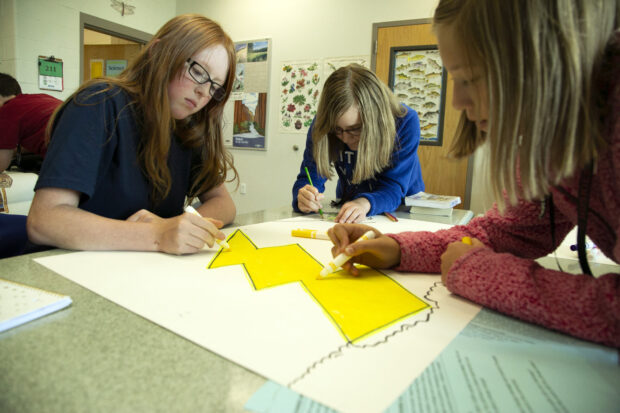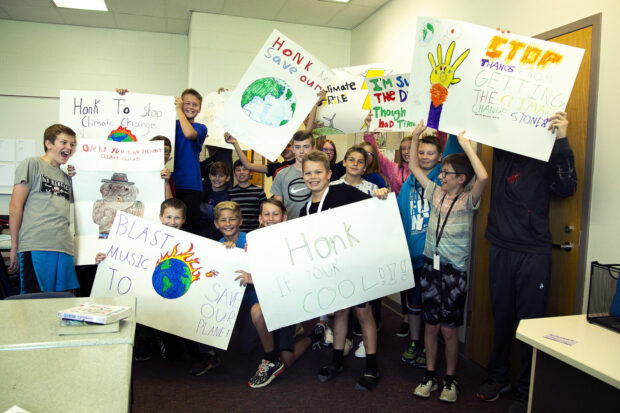Micah Lauer was home sick Tuesday, catching up on the news, when he came across a story about Friday’s student strike against climate change.
“We can’t not do this,” Lauer, a seventh-grade science teacher, thought to himself. “It would be irresponsible to let this go by.”
Lauer came to school Wednesday with a plan. And on Friday, his students at the West Ada School District’s Heritage Middle School joined children across the globe in calling for action on climate change. Unlike the students who rallied at the Idaho State Capitol, or walked out of classrooms from Afghanistan to Great Britain, Lauer’s class made a stand from their school campus.
Lauer’s students visited other classrooms to teach their peers about climate change, distributed calls-to-action and collected signatures on petitions. In the last 20 minutes of class, they joined the international furor with their own small demonstrations at the corner of East McMillan and North Meridian roads in Meridian.
The climate strike gave kids a chance to learn about the environment, Lauer said, sneak in seventh-grade science standards, and decide for themselves if — and how — they wanted to participate in the international movement.
Twelve-year-old Lily Parker “didn’t think much of it” when Lauer first approached her class with the idea of participating in the #ClimateStrike.
Videos about climate change and Greta Thunberg, the 16-year-old Swedish environmental activist spearheading Generation Z’s climate protests, changed her mind.
“I got really inspired,” said Parker, as she colored a protest sign that will later be hung in the school.

What struck her most was “the idea that the young people of our generation can actually stand up for something.”
Parker’s classmates, Kasen Bethke and Marty Ward, took it upon themselves to train younger students. They spoke to sixth-graders about carbon being trapped in the atmosphere and the warming effect it could have on the planet.
“We want them to understand, and get their imaginations running to help us prevent climate change,” Ward said.
Before science class, Bethke said he didn’t feel very informed about climate change.
“No one really brought it up, they’re more concerned about stuff like politics,” he said. “(Climate change) is a very important thing that we should take care of now, instead of doing what the adults did and being like, ‘Nah, let’s not worry about this.'”
Bethke and Ward joined classmates outside Friday, their hand-drawn poster of Smokey Bear bending in the blustery wind.
“Only you can prevent climate change,” their sign said.
“I’m sure the dinosaurs thought they had time too,” read another.
Kids yelled for cars to honk, and drew mixed reactions. Most drivers waved and tooted the horn. One man gunned the engine in his diesel truck, dusting the seventh-graders with the smell of fumes. Another gave a thumbs down.
“Hey, that happens,” Lauer told his class, who kept protesting. Some did backflips when cars honked.
The quick protest wasn’t all fun and games. Two students used clipboards to count up the number of cars that passed and the drivers’ reactions — data Lauer’s students will use in class next week to talk about scientific measurements, and to assess their impact.
Asked about their potential impact, the 12- and 13-year-olds said they could make changes in their personal lives: educate their peers, use metal straws, bike to school and stop using plastic water bottles.
They were generally optimistic. But not immune to the gravitas of the challenge ahead.
“I feel like we can solve it, but it scares me, too,” said Bethke. “It’s been so long since it started and we still haven’t taken care of it by now. It just makes me wonder, is this going to be ignored again or are we going to solve a problem that is going to affect us all?”

